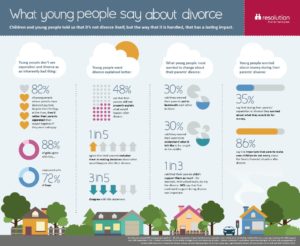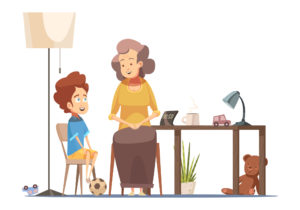When I first used to ask clients contacting me for the first time if they knew what mediation was about then there was often a “not really”. Now I find clients making contact are aware of what mediation is, and have either made an independent decision that it is the right way forward for them, or have had a lawyer direct them towards mediation. Yet there is still not much known about child inclusive mediation which can be such a useful tool for parents, and an empowering experience for their child or children.
What is child inclusive mediation?
Where parents are using mediation (and potentially even if they are not) to talk about what happens next for them, and their child(ren), in light of their separation, it is possible (and often sensible) for their child(ren) to also talk to the mediator. This enables the child to have a voice in what is going to happen next. Too many children feel they weren’t spoken to in their parents’ separation – that no one spoke to them about changes that were going to happen, or sought their opinion on what they might like to happen. If you look at the statistics on the picture below, 48% of children say their parents didn’t properly explain what would happen after the divorce. Often children have things they’d like to say or discuss but can sometimes feel hesitant to discuss these with their parents. They can see their parents are upset, stressed, angry or irritable and worry about upsetting the apple cart. This can be because they love their parent and don’t want to cause them any further upset. It can also be because they recognise that they might create a more difficult situation for themselves if they say something that might be unpalatable to one or both parents. Having an impartial third party to talk to and air their views about the situation can be hugely cathartic for a child. It can be empowering too to have a grown up listening intently to their views and suggestions. Suddenly their opinion is important in all of this.
It’s important to be clear that this is not about getting children to choose which parent they live with – that would be a damaging and heart breaking responsibility that would be far too much. This is about creating a safe space where children can air their views on the situation. Maybe they’re worrying that they won’t have enough time with dad or mum? It could be that they have heard stories from friends whose parents have separated and are worried that they won’t get to go to football on a Saturday, or they won’t have a birthday party any more, or that they will forever be packing a bag and forgetting their PE kit because it’s at the other parent’s house, and getting into trouble at school. They may have creative ideas on how to improve their current situation that they’d like to share but no one has ever asked them what they think before. They may not want to talk to a mediator but without asking them, you cannot know whether they would find it beneficial or not. Affording them the opportunity to have this conversation can also prevent this being thrown back at you at a later date with an angry “you never asked me about how I felt, or gave me the chance to talk to anyone”.
Why would you use it?
There are many reasons to think about creating the chance for your child to talk to a mediator. Whilst this may produce a better outcome for you and for your child(ren), I think there are benefits that are not necessarily linked to the outcome. These are to be found in the process. Simply giving your child the opportunity. It could be that they don’t want to talk to the mediator – who is after all a stranger. But simply asking them if they want to could open up a conversation you have not had before. A mediator will only meet with a child (or children) where BOTH parents AND the child are in agreement that this should happen.
Speaking to the mediator affords a child or children the chance to get things off their chest to someone who is not connected to the situation in any personal sense. A mediator will only pass on to the parents what the child or children want them to. So a child could come and talk to the mediator and it could be a cathartic experience to share things that have bothered them, that they don’t like and feel fed up with and for them this may be enough. They may feel they don’t need their parents to know because it would upset them but they feel better for being able to tell someone. This can be frustrating for parents to have invested in the process (emotionally as well as economically) and to find the mediator has no messages to pass on to them, but they may find that their child has found it beneficial and now seems happier.
Where there is information to pass on, this will be entirely from the child’s perspective. How often as parents do we think we know how our child will deal with a situation, and have then been completely surprised when they react in a different way? It’s often hard in a separation for parents to separate how their child feels about the situation, from how they feel. They may have very strong feelings about how the other parent has behaved but to the child that person is still their mum or dad. Parents tend to look at arrangements as apportioning time between parents but this is not often a child’s agenda. This was highlighted by Professor Liz Trinder (Professor of socio-legal studies at Exeter University who has studied many separation related issues) in an article published in November, 2010.
How is it set up?
Preparation and clarity are crucial in making this process a success and so it’s important both parents understand the process before approaching a conversation with their child(ren). Parents need to agree not to coach or influence their children, and not to ask them about it afterwards. It’s also important to give some thought to raising it with your child(ren): will this be done by both of you? Or will it be one parent that talks to them? If your child wishes to take things forward then the mediator will contact them in an appropriate way to make arrangements. A meeting is arranged with the child or children (and siblings can see the mediator together or separately – or both). The mediator will be specially qualified and insured to see children and will be well equipped to put children at their ease and will use toys, drawing or other activities during the meeting to make the conversation less intense. It is made clear to children that only what they want to be shared will be shared with their parents. A mediator will use the children’s own words and will simply report these back to the parents. They don’t add to the words, or interpret them for the parents.
Who can talk to the mediator?
It is usually the case that older children will be the ones who would talk to a mediator. Children of around 10 and upwards may have sufficient maturity but each case needs to be considered for its own unique situation. Maybe you have a 9 year old who is bursting to talk to someone? Perhaps you have siblings where some are older but some are younger and the younger children are adamant that if their older siblings are talking to the mediator then they are too. Talk to your mediator about this and see what they say. If they are not qualified to see children then they may bring another mediator in to arrange this, or send you to a specially qualified mediator.
To end this blog I wanted to share some quotes from children so that their voices were heard in this blog. These quotes come from the “What most children say” leaflet prepared by Kent Mediation Service:
“Try not to argue in front of us but tell us what is happening and why although we don’t want to hear any personal details, or be involved in whose fault you think it was”.
“We are mostly sad or angry that you can’t live together any more. But we can cope and get on with our lives, so long as you do too. If you don’t, we can’t.”
“We need to be close to both of you. This means we like doing ordinary, everyday things with both of you – eating, playing, going to bed and getting up, going to school, watching TV……”
If you’d like to know more about Child Inclusive Mediation then have a look at the web page or contact us.
Photo Credit: ID 106340055 © Macrovector | Dreamstime.com
